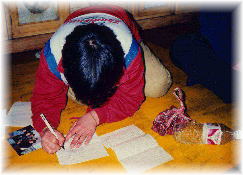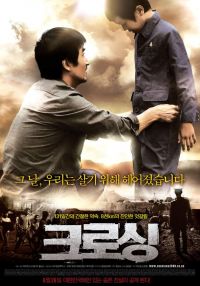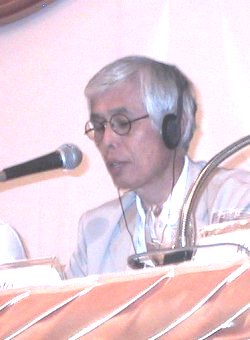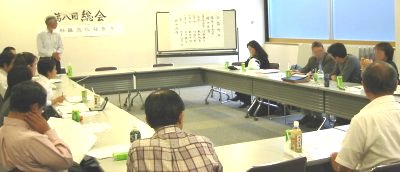Search Results for: foster parents
LFNKR’s 19th ANNUAL MEETING HELD ON OCT. 10, 2016
Annual Meeting Held in Tokyo
A summary of LFNKR activities during fiscal 2015 (Sept. 1, 2015 to Aug. 31, 2016) and the plans for the next fiscal year were outlined at the annual meeting.
About
Why This NGO Was Founded

A child writes her foster parents a letter
There are currently many refugees from North Korea (Democratic People’s Republic of Korea) living in hiding in Russia and China. Credible sources put this number at somewhere between 100,000 and 300,000.
Among those refugees are many who crossed the border to escape starvation from the widespread food shortage in their country. Many others crossed the border to flee torture, prison camps or public execution.
Our NGO is just a small citizens’ group in Japan. We have no particular political stance, ideology or religious preference.
We simply have learned of the refugees and their great difficulties. And we have heard their compelling plea: “We want to live. Please help us.”
Some here in Japan protest that “this is too big a task for us… let the government handle it.” Some say that “This is a Japanese NGO, so it should concentrate on helping only returnees to Japan and Korean residents in Japan.
But we cannot ask people their hometowns before deciding whether we will help them. We do not think it is right to extend help only if they have relatives in Japan, nor to turn our backs on them if they were born in North Korea. Every one of those refugees risked their very lives to escape.
Japan and the Korean Peninsula share a tragic history that includes episodes of colonial rule and wars. As a result, there were nearly 100,000 ethnic Koreans born in Japan who chose to return to their fatherland, though they had never before set foot on their native soil. In most cases, they made that decision after suffering severe racial discrimination and poverty in postwar Japan. They chose to try and help restore their fatherland, which had been burnt away during the Korean War, rather than sit and suffer silently in Japan.
With soaring motives, they returned to their fatherland with high hopes. But what did they find there? Rather than the socialist paradise on earth or the utopia that they had hoped for, they faced still further discrimination, piled upon poverty, heaped upon starvation.
One of the important lessons that history teaches is the importance of never discriminating against another for physical characteristics, race, nationality, age, handicap, nor any other reason. This includes country of origin, occupation, ideology, and creed.
How many North Korean refugees can be saved by this small, weak citizens’ group in Japan? It is said that the North Korean refugees number possibly into the hundreds of thousands. If the North Korean state were to collapse, then we could conceivably see twenty-two million refugees.
These figures, though overwhelming, do not mean we should simply give up. What could we say to those who cry out to us for a helping hand? It is the warm humanitarian rescue efforts of each individual member of this citizens’ group that stands as a beacon of hope for the suffering refugees who have fled North Korea.

Survivor of NK Starvation Speaks

NK orphan talks about the movie “Crossing”
At the Jan. 29 preview of the movie “Crossing” in Tokyo, one of LFNKR’s foster children joined the preview press conference to talk about her experiences. An orphan, she had lost her parents to starvation in North Korea, but is now a university student in South Korea. LFNKR members are happy see that she has grown into such a fine lady. The movie apparently reminded her of her own childhood.
Report on LFNKR Activities in FY 2007-2008
Annual Activities Report
Introduction
For the Beijing Olympics held in August 2008, the Chinese and North Korean authorities continued their strict crackdown on North Korean defectors in the border areas and in China. The crackdown was so strict that even the transportation of public supplies were mostly prohibited.
Nevertheless, the inflow of North Korean defectors into China has not stopped, although the scale of the inflow is smaller than that during the period from late 1990s to early 2000s. The Chinese government still arrests and repatriates North Korean refugees, knowing that these people will be severely punished if sent back to their own country.
International society still repeatedly protests the repatriations by the Chinese government. The UN special rapporteur on human rights in North Korea has not yet been allowed access to conduct a probe of human-rights conditions in North Korea.
However, as the abuse of human rights in North Korea have become more widely disclosed around the world, international pressures on the North Korean government have grown. For example, many nations have come to question the effectiveness of international food aid to North Korea and stopped responding to requests from the World Food Program (WFP). There has been a tug of war between North Korea and aiding nations, which have specifically stated that they would provide food aid on condition that the North Korean government allow them to establish monitoring systems to assure their food aid will be properly used.
Reports from LFNKR local staff
According to recent reports from local staff members working at LFNKR’s shelters in the border area and LFNKR local workers in North Korea, the aged and children are starving to death in a village area located three railway stations inland from Musan, North Hamgyong, and deaths from malnutrition and starvation are starting up again in Hamhun, South Hamgyong and Chonjin in North Hamgyong.
Even large, first-tier corporations employing 2,000 or more have had to suspend their operations because they cannot procure materials, meaning that they cannot provide their employees with food. LFNKR has handed food to those people who came to China intending to return to North Korea once they had food. During the past year, LFNKR has distributed more than 30 tons of food in the border area to these needy North Koreans.
Human Trafficking and Orphans with no Nationality
At least 60% of North Korean defectors are female, and most of them become victims of human trafficking. Many of them are sold as brides to farmers in inland China because the villages in inland China are suffering from a shortage of marriageable women. Since the Chinese government launched its reform and opening-up policy, many young Chinese women in villages have moved away to urban areas in China, the South China economic bloc, South Korea and Japan where they can earn good pay.
In the Yanbien Korean Autonomous Region, about 8,000 Korean Chinese have been flocking to South Korea each year to work away from home. To fill this void, the Han people have moved into the region from other provinces. The disappearance of the Korean Autonomous Region is considered only a matter of time.Many of the Chinese farmers to whom North Korean women are sold are incapable of making a living. Often they suffer from metal disorders, or have little sense of social responsibility. Hence, if their North Korea wives are repatriated, the Chinese husbands tend to abandon any children they have. This is why the number of children with no nationality is increasing yearly.
One of the major activities of LFNKR is to protect these abandoned children under its education sponsorship program. LFNKR is happy to see those foster children raised under the program and eventually resettled in South Korea, where they can enjoy satisfying lives, attend university or technical college, and happily marry.[Chronological list of major activities during the last fiscal year]
Summary of Major Activities
- Participated in Thai International Conference on North Korean Refugees and Human Rights in North Korea held on Sept. 17-21, 2007
- Helped Tokyo Bar Association with their research on human rights in North Korea (Sept. 19, 2007)
- Held discussions with Guard Division, Japan Coast Guard (Oct. 2, 2007)
- Participated in Global Festival held in Tokyo to publicize the North Korean refugee issue (Oct. 6-7, 2007)
- Initiated a rescue plan for North Korean defector, Ms. R, who contacted LFNKR requesting help (Nov. 2, 2007)
- Successfully protected North Korean defector, Ms. E (Nov. 8, 2007)
- Attended at the 50th anniversary of Arakawa No. 9 Junior High School where North Korean defectors who have settled in Japan attend night classes (Nov. 11, 2007)
- Participated in NGO conference during the North Korean Human Rights Abuse Awareness Week (Dec. 14, 2007)
- Participated in the conference held in Sendai (city in northern Japan) one of a series of events for the North Korean Human Rights Awareness Week (Dec. 16, 2007)
- Mr. Kato, executive director of LFNKR, spoke on the North Korean human rights issue as a guest speaker at Christian University in South Korea (Dec. 20, 2007)
- Interviewed by Prof. Vitit Muntarbhorn, the UN Special Rapporteur on NK Human Rights (Jan. 30, 2008)
- LFNKR received the family of a North Korean defector, Mr. K, who safely arrived in Tokyo (Jan. 30, 2008)
- Mr. Kato was a guest speaker at the international scholarly conference on North Korean human rights hosted by Christian University in South Korea (March 20, 2008)
- Mr. Kato was a guest speaker, at a public meeting hosted by Kanagawa Branch, the National Association for Rescue of Japanese Abducted by North Korea (March 23, 2008)
- Demonstrated with banners and placards protesting the North Korean human rights issue at the Olympics torch relay in Nagano, Japan (Apr. 26, 2008)
- Held discussions with NK & Beyond Missions International, a British NGO (June 6, 2008)
- Met with Open Radio North Korea
- Investigated development of a safe southern rescue route
Securing safety and protection of North Korean refugees
LFNKR has maintained a low-profile policy as much as possible in rescuing and protecting North Korean refugees. During the past year, no NGO humanitarian aid workers involved in LFNKR rescue activities has been arrested or held.
Most of LFNKR’s shelters, except for access points in the border area, are located in mountains to avoid the strict crackdown. LFNKR has supplied a total of about 20 tons of rice to more than 700 North Korean defectors and supplied about 500 sets of winter clothing and 2,000 pairs of socks to North Korean defectors.
One of LFNKR’s plans to help North Korean refugees wishing to settle in China is to help them acquire calves, so that they can raise and sell for profit. This should help the refugees become financially independent. This plan has been implemented at a few places in Jilin Province. So far, the plan has gone forward smoothly.
LFNKR has provided five North Korean refugee families (12 people) with protection until they reached safe places, and also helped one family (3 persons) to settle in Japan. LFNKR has assisted about 30 North Korean refugees in settling in South Korea. Among them are daughters of Japanese wives and the children of ethnic Koreans who originally lived in Japan.
Medical Aid
LFNKR distributed 350 family medical kits in North Korea. These medical kits were procured in China and Japan, and each kit includes pain killers, antiphlogistics, nutritional supplements, etc.
Educational Sponsorship Program
Currently, over 20 refugee orphans are protected under the LFNKR educational sponsorship program. Two new shelters have been added. The foster children under the program receive money to cover their living expenses and education expenses from LFNKR through its local staff responsible for the program. The foster parents are notified of how their foster children are doing by letters from the children or by LFNKR newsletters on an irregular basis.
Most of the foster children were born to Chinese men and North Korean women who were victims of human trafficking. These children have no “nationality” because the Chinese government continues to treat their mothers as illegal immigrants. Most of their fathers are incapable of making a living or are indifferent to raising children. Meanwhile, the Chinese authorities continue to arrest and repatriate their mothers, mothers who are trying to raise their children and therefore should be granted the legal right to stay in China.
It is a sad fact that the foster children are not allowed to have legitimate inhabitant registration certificates in China, so that cannot enter high schools or higher educational facilities, no matter how excellent their school record. Even if they try for a higher education, they are highly likely to be denied entry, and may even be arrested and repatriated. These children are abandoned not only by their parents but by the Chinese government as well. The number of such children now reaching school age continues to rise.
Assisting Settling in
LFNKR has worked together with other NGOs to help North Korean defectors reach safe places in third countries. LFNKR has helped a number of refugees settle in Japan when they have explicitly rdquested this by working together with related governmental divisions, NGOs, and the North Korean Refugee Support Center of the Korean Residents Union in Japan (Mindan).
Among the North Korean defectors who have settled in Japan, those who are aged or suffer from chronic diseases receive welfare benefits, while most young defectors relatively quickly graduate from welfare and start leading independent lives.
International lobbying
Especially significant among the international lobbying activities were the field survey of North Korean refugees in Thailand and the meetings with the Thai National Human Rights Committee, the Thai Ministry of Foreign Affairs, and the Chiangrai Immigration Bureau as well as police in the Thailand/Laos border area. We held discussions with them primarily on human rights and how to improve conditions at the overcrowded detention center.
Letters from NK Refugee Kids in Hidden Shelters

June 2008
LFNKR recently received letters from several of our foster children who are currently in first to third grades of elementary school. These children are being supported under LFNKR’s education sponsorship program. In their letters to their foster parents, the children mainly report on their school records.
LFNKR’s Kato Speaks on Human Trafficing of NK Women

Speech by Kato Hiroshi, Executive Director
Life Funds for North Korean Refugees
Ladies and gentlemen, it is an honor for me to be here today and I would like to thank The Committee for the Bangkok International Conference for North Korean Human Rights for giving me the opportunity to say a few words on behalf of Life Funds for North Korean Refugees.
Report – What We Did in Fiscal Year 2005
Sept. 2004 to Aug. 2005
On Oct. 9, 2005, LFNKR held its annual General Meeting in Tokyo.






